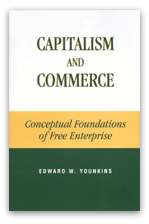The author shows that the survival and flourishing of business as an institution
depends on concepts and moral values which are the very foundation of personal
freedom and individualism within civil society. He addresses ideas such
as natural law, natural rights, individualism, private property, freedom,
personal responsibility, the corporation, voluntary unionism, justice,
law, and others. He further argues that these concepts are the foundation
upon which a capitalistic society is built. Another refreshing approach
in this work is the fact that not only does he discuss the effect of these
concepts and values, Younkins clearly defines and discusses each of them
in an easily approachable manner and language.
Capitalism and Commerce provides a systematic treatment of the conceptual
foundations of business as it has developed over centuries through a number
of disciplines, including philosophy, economics, political science, law,
and history. The work introduces people to the idea of the free market
as a moral institution with a very valid and compelling theoretical framework,
rather than the more common perception of a merely pragmatic means of efficient
production.
The book is at its core about freedom, and the discovery of the type of
society men require in order to engage in their own pursuit of happiness.
By not relying strictly on one school of thought and the inherent flaws
therein, and instead addressing many different metaphysical and religious
points of view, Younkins is able to offer the best of all arguments to
make his points. |

|
He draws his own principles mainly from classical liberalism, the Austrian
School, Jewish and Christian economic personalism, the Public Choice School,
the Chicago School, and the school of human flourishing initiated by Aristotle.
His ten chapters on the "obstacles to a free society" will undoubtedly
invite a tremendous amount of discussion. As a result of this approach,
Younkins' book covers all the major issues in a manner that can appeal
to people from various schools of thought. He is able to present the various
systems that make up the world in an integrated, consistent, and natural
fashion. He explains that freedom is an integrated whole.
|
« While the goal of this book seems like a huge and complex task,
Dr. Younkins has broken it down into five simple categories, each building
on the foundation of those before it, and leading to an extremely clear
understanding of our political, economic, and civil society, as well as
the interdependence of each upon the other. » |

|
I also think his clear, jargon-free explanations make his writing understandable
to a wide range of readers. He presents the essential case for political
and economic liberty in an interesting and highly accessible form. He writes
that capitalism not only generates great wealth but also creates an environment
in which morality and virtue can and should flourish. Civil, social, political,
and economic society all thrive in a capitalist system where its members
interact by mutual agreement and to their mutual advantage.
While the goal of this book seems like a huge and complex task, Dr. Younkins
has broken it down into five simple categories, each building on the foundation
of those before it, and leading to an extremely clear understanding of
our political, economic, and civil society, as well as the interdependence
of each upon the other. At the same time, he has done something others
rarely take the time or effort to do; he has explained the flaws in the
arguments of those who try to philosophically attack or discourage free
enterprise. His presentations of the ideas of Rousseau, Kant, and Marx
are superb. He addresses each of the common questions and criticisms that
have been leveled about the morality or practicality of capitalism. His
work stands out in its field, and will no doubt become a contemporary classic
in the not-too-distant future. It should be read by every student, business
professional, politician, and journalist in America and should be part
of every college curriculum.
In my opinion, Capitalism and Commerce is a nearly flawless work!
The only flaw, an easily corrected one, involves the presence of a typical
number of typos for the first printing of a book. Since this book is destined
to be around for many years, it would be in the interest of both the publisher
and the reading public to correct these errors as soon as possible.
|



